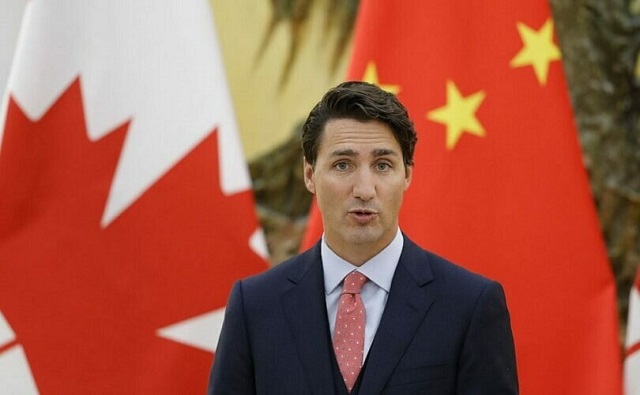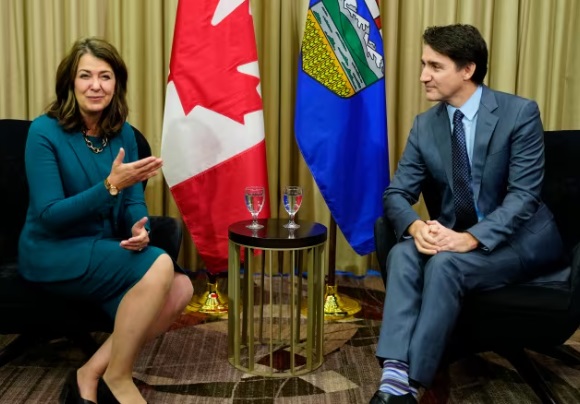Alberta
Saskatchewan Premier Scott Moe is leading the fight against our own federal government to save Canada
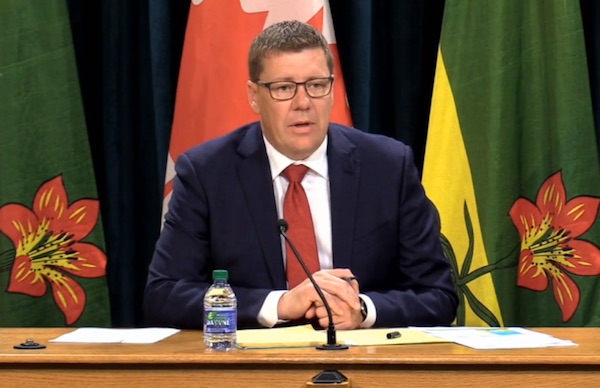
Article submitted by Josh Andrus of Project Confederation
A lot of media attention of late has been focused on the Emergencies Act testimonies in Ottawa and Danielle Smith’s rise to the Premier’s Office here in Alberta.
However, the biggest development in federal/provincial politics in the last week might actually have happened in Saskatchewan, where Premier Scott Moe has taken a firm stance against the federal government in a document entitled Drawing the Line: Defending Saskatchewan’s Economic Autonomy.
The paper clearly sets out a problem and then proposes specific solutions.
First, the problem…
The Saskatchewan government has identified nine different federal climate change policies that are estimated to cost the province a total of $111 billion between 2022 and 2035 – the approximate halfway point to the federal government’s 2050 net-zero targets.
The costs of each of the nine policies are:
- Federal Carbon Tax: $24.7 billion;
- Oil and Gas Methane Mandate: $6.3 billion;
- Oil and Gas Emissions Cap: $2.6 billion;
- Fertilizer Mandate: $19.3 billion;
- Clean Fuel Regulations: $34.9 billion;
- Zero Emission Vehicle Mandate: $10.3 billion;
- Federal Output Based Pricing System: $12.5 billion;
- Agriculture Methane Initiatives: $0.5 billion;
- Landfill Methane Mandate: $0.2 billion.
Don’t forget – these are just the direct costs.
We all know that the energy industry powers every other industry and, since energy is required to create almost every other product, as energy prices increase, costs for consumer goods will undoubtedly rise across the board as well.
Scott Moe and his team have a clear understanding of the problem and are deeply concerned about the impacts federal environmental policy can have on the economy.
For a province like Saskatchewan, where total provincial revenue for 2022 was just $17.2 billion, $111 billion is a gigantic cost.
And if that’s the cost to our neighbours, imagine what it will cost here in Alberta!
Remember too, this is just the first half of the federal government’s 2050 plan!
The economic costs of Net Zero 2050 are completely lost on the Trudeau government.
The 2021 Supreme Court of Canada ruling on the constitutionality of the Carbon Tax, as we noted at the time, creates a dangerous precedent where the federal government can essentially trample all over the constitutional jurisdiction of provinces using the Peace, Order, and Good Governance Clause embedded in the constitution.
This means that the Supreme Court has effectively ruled that the federal government can take control of practically any issue, simply by claiming that it is a matter of national concern – completely ignoring provincial jurisdiction.
Consider that the definition of Confederation, as espoused by the Oxford English Dictionary, is a union of sovereign groups or states united for purposes of common action.
Instead, what we now have is a federal government that has decided, upon the alter of climate change, to sacrifice our livelihoods and, with them, the very idea of Canada itself.
If we want to save this country, we need substantial reforms to the way this country is governed.
Thankfully, the Saskatchewan government’s paper also proposes some solutions that include:
- Provincial legislation to clarify and protect constitutional rights belonging to the province.
- Pursuing greater autonomy over immigration policy to ensure Saskatchewan has the people it needs.
- Better recognition of Saskatchewan industry’s contributions to sustainable growth – for example, developing a carbon credit market to support our natural resource industries.
- Preparing to take legal actions, legislative or otherwise, to maintain control of electricity, fertilizer emission/use targets and oil and gas emissions/production.
Here at Project Confederation, we’re very supportive of these ideas – in fact, many of them are ideas we’ve been promoting not just for Alberta, but for all of the west, since we launched as an organization.
So, props to Scott Moe and the Saskatchewan government for pushing us down the right path.
With your continued support, we can’t help but be excited about what we are capable of as we move forward.
Having seen significant success in Alberta already, we will be expanding our work all across Saskatchewan and the other western provinces in the coming months, as we take on Ottawa and prepare for the onslaught of a hostile federal government over the next few years.
If you’d like to get involved in our campaigns, you can sign up to volunteer with us here.
We also need financial support to continue with our work.
If you can afford to help fund our important work, please click here to make a contribution:
Thank you again to everyone for their help with this campaign and we look forward to working with you on many more issues in the future.
Regards,
Josh Andrus
Executive Director
Project Confederation
Alberta
Alberta moves to protect Edmonton park from Trudeau government’s ‘diversity’ plan

From LifeSiteNews
If Trudeau’s National Urban Park Initiative is implemented, Alberta could see its parks, including Edmonton’s River Valley, hijacked by the federal government in the name of ‘sustainability, conservation, equity, diversity, inclusion, and reconciliation.’
Edmonton is working to protect its River Valley from the Trudeau government’s “diversity” park plan.
On April 15, Alberta Legislature passed MLA Brandon Lunty’s private members’ Bill 204 to protect the Edmonton River Valley from Prime Minister Justin Trudeau’s National Urban Park Initiative which would give the federal government power over provincial parks to enforce a variety of quotas related to the “climate” and “diversity.”
“Albertans elected our United Conservative government with a majority mandate to, among other things, protect families and communities from federal overreach and intrusion. That’s exactly what this bill accomplishes,” Lunty said in a press release.
Bill 204, titled the Municipal Government (National Urban Parks) Amendment Act, is a response to the National Urban Park Initiative which would give the Trudeau government jurisdiction over Alberta’s provincial parks.
The Trudeau government’s plan promises to “provide long-lasting benefits to the urban area” by using “sustainability, conservation, equity, diversity, inclusion, and reconciliation.”
If the program is approved, the Edmonton River Valley could be “fully owned by the Federal Government,” which will use the space to advance their values, including addressing the impacts of “climate change” and creating spaces where “diversity is welcomed.”
The plan also promises that equity will be “intentionally advanced” while “respecting indigenous rights” through “reconciliation.”
However, many Edmonton citizens were concerned with the Urban Park Initiative and met with their MLAs to discuss the issue.
Edmonton citizen Sheila Phimester worked with MLA Jackie Lovely to create a petition to prevent the River Valley from becoming federally owned. The petition has received over 5,000 signatures.
“Instead of Edmontonians making decisions about what happens in the park, Ottawa would be making the decisions,” the petition warned.
“Oh, and because it’s the federal government, their ‘priorities’ for these parks are ‘healthier communities’, ‘climate resilience’, ‘reconciliation’, ‘equity’, ‘diversity’, and ‘inclusion,’” it continued.
Already, Trudeau has attempted to assert power over Alberta’s industry by placing “climate” restrictions on their oil and gas production in an attempt to force net-zero regulations on all Canadian provinces, including on electricity generation, by as early as 2035.
However, Alberta Premier Danielle Smith has repeatedly vowed to protect the province from Trudeau’s radical “net zero” push.
In December, Alberta Premier Danielle Smith blasted Trudeau’s Environment Minister Steven Guilbeault’s plan to slash oil and gas emissions by 35 percent to 38 percent below 2019 levels as “unrealistic” and “unconstitutional.”
Trudeau’s current environmental goals are in lockstep with the United Nations’ “2030 Agenda for Sustainable Development” and include phasing out coal-fired power plants, reducing fertilizer usage, and curbing natural gas use over the coming decades.
The reduction and eventual elimination of the use of so-called “fossil fuels” and a transition to unreliable “green” energy has also been pushed by the World Economic Forum (WEF) – the globalist group behind the socialist “Great Reset” agenda – an organization in which Trudeau and some of his cabinet are involved.
In November, after announcing she had “enough” of Trudeau’s extreme environmental rules, Smith said her province had no choice but to assert control over its electricity grid to combat federal overreach by enacting its Sovereignty Act. The Sovereignty Act serves to shield Albertans from future power blackouts due to federal government overreach.
Unlike most provinces in Canada, Alberta’s electricity industry is nearly fully deregulated. However, the government still has the ability to take control of it at a moment’s notice.
Alberta
Coutts Three verdict: A warning to protestors who act as liaison with police
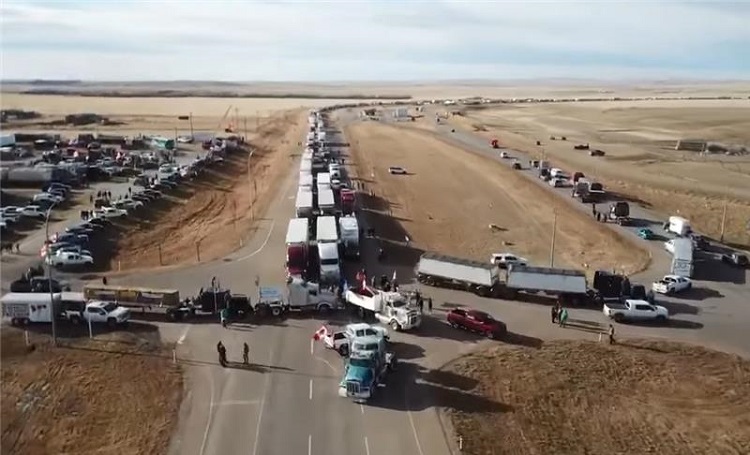
From the Frontier Centre for Public Policy
By Ray McGinnis
During the trial numbers of RCMP officers conceded that the Coutts Three were helpful in their interactions with the law. As well, there didn’t seem to be any truth to the suggestion that Van Huigenbos, Van Herk and Janzen were leaders of the protest.
Twelve jurors have found the Coutts Three guilty of mischief over $5,000 at a courthouse in Lethbridge, Alberta. Marco Van Huigenbois, Alex Van Herk and George Janzen will appear again in court on July 22 for sentencing.
Van Huigenbois, Van Herk and Janzen were each protesting at the Coutts Blockade in 2022. A blockade of Alberta Highway 4 began on January 29, 2022, blocking traffic, on and off, on Alberta Highway 4 near the Coutts-Sweetgrass Canada-USA border crossing. The protests were in support of the Freedom Convoy protests in Ottawa.
Protests began due to the vaccine mandates for truckers entering Canada, and lockdowns that bankrupted 120,000 small businesses. Government edicts were purportedly for “public health” to stop the spread of the C-19 virus. Yet the CDC’s Dr. Rachel Wallensky admitted on CNN in August 2021 the vaccine did not prevent infection or stop transmission.
By February 2022, a US court forced Pfizer to release its “Cumulative Analysis of Post-Authorization Adverse Event Reports” revealing the company knew by the end of February, 2021, that 1,223 people had a “case outcome” of “fatal” as a result of taking the companies’ vaccine.
On the day of February 14, 2022, the three men spoke to Coutts protesters after a cache of weapons had been displayed by the RCMP. These were in connection with the arrest of the Coutts Four. Van Huigenbos and others persuaded the protesters to leave Coutts, which they did by February 15, 2022.
During the trial numbers of RCMP officers conceded that the Coutts Three were helpful in their interactions with the law. As well, there didn’t seem to be any truth to the suggestion that Van Huigenbos, Van Herk and Janzen were leaders of the protest.
RCMP officer Greg Tulloch testified that there were a number of “factions” within the larger protest group. These factions had strong disagreements about how to proceed with the protest. The Crown contended the Coutts Three were the leaders of the protest.
During his testimony, Tulloch recalled how Van Huigenbos and Janzen assisted him in getting past the “vehicle blockade to enter Coutts at a time during the protest when access to Coutts from the north via the AB-4 highway was blocked.” Tulloch also testified that Janzen and Van Huigenbos helped with handling RCMP negotiations with the protesters. Tulloch gave credit to these two “being able to help move vehicles at times to open lanes on the AB-4 highway to facilitate the flow of traffic in both directions.”
During cross examination by George Janzen’s lawyer, Alan Honner, Tulloch stated that he noticed two of the defendants assisting RCMP with reopening the highway in both directions. Honner said in summary, “[Marco Van Huigenbos and George Janzen] didn’t close the road, they opened it.”
Mark Wielgosz, an RCMP officer for over twenty years, worked as a liaison between law enforcement and protesters at the Coutts blockade. Taking the stand, he concurred that there was sharp disagreement among the Coutts protesters and the path forward with their demonstration. Rebel News video clips “submitted by both the Crown and defence teams captured these disagreements as demonstrators congregated in the Smuggler’s Saloon, a location where many of the protesters met to discuss and debate their demonstration.” Wielgosz made several attempts to name the leaders of the protest in his role as a RCMP liaison with the protesters, but was unsuccessful.”
However, the Crown maintained that the protest unlawfully obstructed people’s access to property on Highway 4.
Canada’s Criminal Code defines mischief as follows in Section 430:
Every one commits mischief who willfully
(a) destroys or damages property;
(b) renders property dangerous, useless, inoperative or ineffective;
(c) obstructs, interrupts or interferes with the lawful use, enjoyment or operation of property; or
(d) obstructs, interrupts or interferes with any person in the lawful use, enjoyment or operation of property.
Robert Kraychik reported that “RCMP Superintendent Gordon Corbett…cried (no comment on the sincerity of this emoting) while testifying about a female RCMP officer that was startled by the movement of a tractor with a large blade during the Coutts blockade/protest.” This was the climax of the trial. A tractor moving some distance away from an officer in rural Alberta, with blades. The shock of it all.
No evidence was presented in the trial that Van Huigenbos, Van Herk and Janzen destroyed or damaged property. Officers testified they couldn’t identify who the protest leaders were. They testified the defendants assisted with opening traffic lanes, and winding down the protest.
By volunteering to liaise with the RCMP, the Crown depicted the Coutts Three as the protest leaders. Who will choose to volunteer at any future peaceful, non-violent, protest to act as a liaison with the policing authorities? Knowing of the verdict handed down on April 16, 2024, in Lethbridge?
Ray McGinnis is a Senior Fellow with the Frontier Centre for Public Policy. His forthcoming book is Unjustified: The Emergencies Act and the Inquiry that Got It Wrong.
-
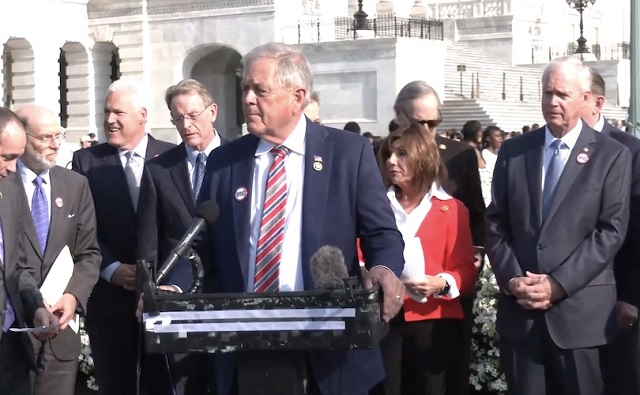
 CBDC Central Bank Digital Currency2 days ago
CBDC Central Bank Digital Currency2 days agoLawmakers, conservatives blast WHO plan for ‘global governance’ on future pandemics
-

 COVID-191 day ago
COVID-191 day agoJapanese study finds ‘significant increases’ in cancer deaths after third mRNA COVID doses
-

 Brownstone Institute1 day ago
Brownstone Institute1 day agoPfizer Lied to Us Again
-

 Brownstone Institute1 day ago
Brownstone Institute1 day agoDid Lockdowns Set a Global Revolt in Motion?
-
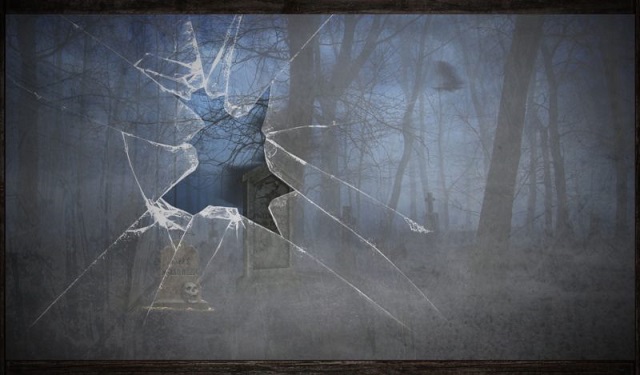
 Brownstone Institute1 day ago
Brownstone Institute1 day agoIs the Overton Window Real, Imagined, or Constructed?
-

 Frontier Centre for Public Policy21 hours ago
Frontier Centre for Public Policy21 hours agoThe tale of two teachers
-

 Bruce Dowbiggin8 hours ago
Bruce Dowbiggin8 hours agoCoyotes Ugly: The Sad Obsession Of Gary Bettman
-
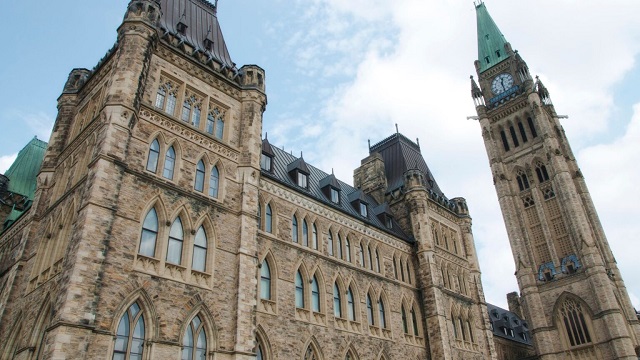
 Freedom Convoy6 hours ago
Freedom Convoy6 hours agoOttawa spent “excessive” $2.2 million fighting Emergencies Act challenge



